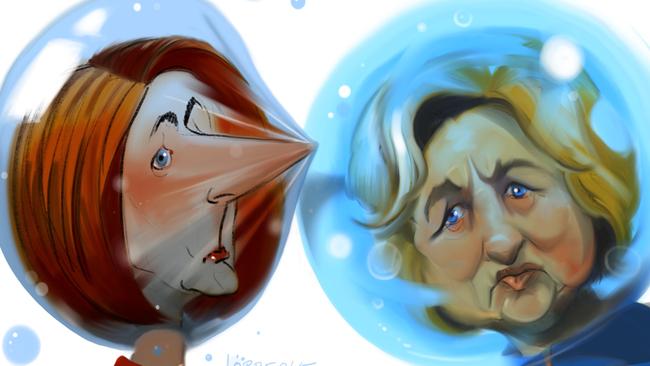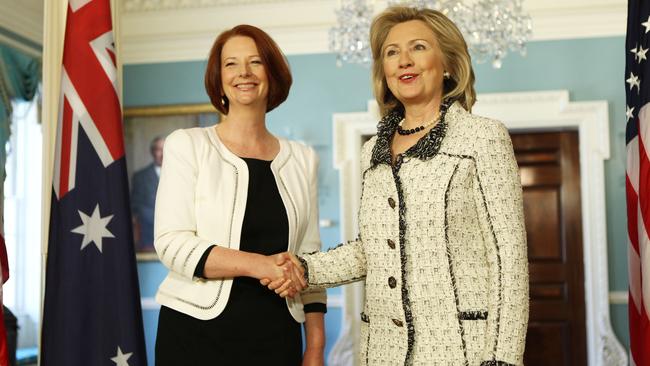If only Julia Gillard and Hillary Clinton could burst their bubbles


Going by their past utterances, it’s not hard to predict how the Julia and Hillary show will unfold.
The former Australian prime minister and the candidate who lost the 2016 US presidential race enter stage left. The women will take turns complaining about careers cruelly cut short because of sexism, discrimination and even misogyny.
Julia Gillard will talk about the double standards in Australian politics. Hillary Clinton will nod, adding tales about an electorate that didn’t understand her and wouldn’t listen to her.
The rise of Donald Trump is a story of rank sexism, she will say, waving her copy of Michael Wolff’s thriller fiction, Fire and Fury. The self-selecting audience will agree with two women who agree with each other. But will women have learned anything from Gillard and Clinton’s women-in-politics gig?
At one level it’s heartening that two intelligent women want to team up to discuss political leadership and encourage more women to enter politics. These are big issues that need discussing and addressing.
Now for the bad news: echo chambers won’t tease out the truth. Inhaling the addictive fumes of furious agreement, whether it’s in cyberspace or in a town hall, can’t possibly get us closer to understanding the real challenges for political leaders, and getting more women into politics. Sadly, Gillard and Clinton may unwittingly lead women to repeat their mistakes.
Let’s imagine a different women-in-politics event. The two feisty women are joined on stage by an inquisitor who tests their assertions and asks them to dig deeper, with humility, into what went wrong. The audience will pick up lessons about what women in the future might do differently.
The inquisitor starts by pointing out that Australia’s first female prime minister was in the job for barely three years and three days, and that the Democratic candidate for the president’s job lost to Trump in 2016.
Then it moves on to where it must, with that misogyny speech.
The inquisitor reminds Julia that when she became PM, she said she wasn’t interested in talking about gender. But then she did talk about gender. A lot. The inquisitor asks why would sexism be more rank in Australia compared to, say, Britain, where Margaret Thatcher became the country’s longest-serving leader in the 20th century, or New Zealand, where Helen Clark became the country’s fifth longest-serving PM?
The former prime minister says she likes being known for her speech even by people who know little else about her. The question unanswered, the inquisitor pushes her a little more, pointing out that when she gave that speech polls were tumbling, her leadership was under the gun from a wily opposition leader and from people within her own party. There was talk of Kevin Rudd coming back as PM.
“Ah, Mr Rudd,” laughs Julia, “our own side described him as a sociopath!”
The audience chortles along with her. But then Julia says something that silences the room.
She answers the question, and with honesty. She admits she let herself down by making some of the same mistakes as Rudd.
“I wasn’t seen as trustworthy, or authentic, and on reflection, it was a fair cop. Promising no carbon tax, only to introduce one, that was a big mistake. I let politics drive over me.”
The audience is gripped by Julia’s candour. And then she continues. “Before I am asked, let me say that I shouldn’t have opposed same-sex marriage as a Labor prime minister. It made no sense. I’m an unmarried atheist and deep down voters knew that I supported same-sex marriage. I let politics make a fool of me.”
Feeling a weight lifted, Australia’s first female prime minister says: “Don’t repeat my mistakes. Voters are hungry for authentic leaders. So stick to your guns, don’t shy away from your convictions. That’s why an old communist bloke in Britain is giving a Tory Prime Minister a run for her money.”
The audience laughs again.

But then more silence, after Julia concedes something else.
“That speech? Yes, of course, I played the gender card for political purposes. There, I’ve said it. My leadership was cratering, I needed to assert myself, but I knew deep down that the polls reflected mistakes, broken promises, unfunded promises, my lack of legitimacy as a prime minister.
“I should have focused on fixing mistakes rather than blaming it on some special form of Australian sexism.
“But those Labor gals, they loved it when I called Tony Abbott a misogynist and when I wore the gender card on my sleeve. They even rang the editor of Marie Claire, Jackie Frank, suggesting a splash for her magazine, with photos and interviews during a Labor girls-only dinner at the Lodge. Yes, it was manufactured. But that’s politics.
“I say to women now, talking about gender will excite a small group of women, but get out of that bubble because it won’t win an election. You need genuine convictions and good policies to do that.”
When the inquisitor suggests Hillary play devil’s advocate to a few of her own grand myths, the now wistful former Democrat candidate gives it a go.
“Maybe I didn’t listen to Americans outside a tiny circle of advisers. Expecting them to find me a message? That was dumb.
“I’d been in politics for decades. I should have had my own message. Targeting minorities while leaving white, working-class voters to wonder whether I was on their side? Dumb. My message is listen to people outside your echo chamber.’’
Seeing an audience engrossed by her honesty, Hillary admits that being ensconced in her own bubble made her conspiratorial, blaming everyone from the Russians and FBI director James Comey to KKK misogynists and even Barack Obama for her loss.
Hillary says she’s come to the view that women who obsess about gender often don’t stop to listen and learn. She mentions an interview she recently watched on Britain’s Channel 4 featuring a female host and a man called Jordan Peterson. The journalist, a feminist, didn’t like what he had to say. So she didn’t listen and her responses made no sense.
“I cringed for her,” says Hillary. “She was so cemented in her dislike of him, that she was snookered, left speechless because she didn’t understand free speech, which is kind of the core business of her profession, isn’t it?”
Then she adds: “I made similar mistakes when confronted by Trump. I was so obsessed with sexist conspiracies that I didn’t listen to him or his supporters. And because I wasn’t listening, I could not respond in a way that made sense to them. I called them deplorables. I didn’t understand my core business, my own country.”
The two women then share a few final observations.
“In this #MeToo moment, it’s tempting to affix a permanent filter of sexism over our careers. But it’s time we removed it, so we can see things more clearly,” says Julia. “Our obsession with sexism prevented us from listening, and working out how to succeed,” says Hillary.
Says the inquisitor, bringing the night to a close: “Australia’s next female prime minister and the first female US president will succeed if they learn from what Julia Gillard and Hillary Clinton said this evening.’’.
The audience applauds, some stand, because two women have passed on a genuine legacy to the women of tomorrow.
janeta@bigpond.net.au



To join the conversation, please log in. Don't have an account? Register
Join the conversation, you are commenting as Logout